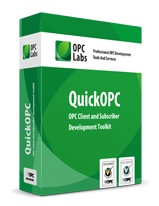QuickOPC Client and Subscriber Toolkit for OPC UA and OPC Classic.
Project description
QuickOPC

- NuGet package: OpcLabs.QuickOpc
- Python package: opclabs_quickopc
QuickOPC is a suite of OPC Client/Subscriber development components for .NET, COM and Python. The components are for OPC Unified Architecture (including OPC UA PubSub), OPC "Classic" (COM/DCOM-based) and OPC XML-DA specifications.
Note: For OPC Server development, see OPC Wizard.
QuickOPC is a commercially licensed product. Without a license key, it runs in a trial mode. The trial provides valid data to client or subscriber applications for 30 minutes; after that period, the component (your app) needs to be re-started, and so on. You must also comply with licensing terms for 3rd-party material redistributed with QuickOPC. For details, see the documentation.
| Ready to purchase? See full price list, or contact us. |
|---|
| Want a U.S.-based vendor? Get OPC Data Client (same product) from Software Toolbox. |
Remember that NuGet or Python packages are primarily a tool for resolving build-time dependencies. The amount of functionality that you get through QuickOPC NuGet or Python packages is smaller than what QuickOPC can actually do for you. If you want a full coverage of the features, you would be better off downloading the Setup program from OPC Labs Web site. Further below you will find a list of differences between the two distribution forms.
QuickOPC requires .NET Framework 4.7.2 or .NET 8.0 as a minimum. Under .NET 8.0+, it is supported on Linux, macOS and Microsoft Windows. QuickOPC can also be easily used from Python.
PLEASE DO NOT USE PRE-RELEASE PACKAGES UNLESS INSTRUCTED TO DO SO.
Need help, tech support, or missing some example? Ask us for it on our Online Forums! You do not have to own a commercial license in order to use Online Forums, and we reply to every post.
Follow us on X (Twitter) | Follow us on LinkedIn
List of available NuGet / Python packages
-
OpcLabs.QuickOpc / opclabs_quickopc: OPC client and subscriber components for all environments and project types.
-
OpcLabs.QuickOpc.Forms: Components that are specific for Windows Forms (can be partially used from WPF as well).
-
OpcLabs.ConnectivityStudio.Sample.CS: Console-based OPC Wizard and QuickOPC examples in C# (source code).
-
OpcLabs.ConnectivityStudio.Sample.VB: Console-based OPC Wizard and QuickOPC examples in VB.NET (source code).
What is included in the NuGet / Python packages
- Runtime assemblies for all OPC specifications and programming models.
- OPC browsing dialogs and browsing controls for Windows Forms.
- NuGet: IntelliSense support (XML comments).
- NuGet: LINQPad examples.
What is only available from the Setup program
- Support for COM development (VB6, PHP, Excel, Delphi and similar tools).
- Visual Studio integration, including Live Binding design-time support (codeless creation of OPC applications).
- Complete set of Examples and Demo applications, bonus material.
- OPC Data Access simulation server, various tools.
What is only available from the Setup program or the Web site
Knowledge Base link - Tool Downloads
- Various tools, such as Connectivity Explorer, Launcher, OPC UA Demo Publisher, OpcCmd Utility, UA Configuration Tool.
- License Manager (GUI or console-based) utility.
How to start
If you do not mind reading the documentation: Getting Started with QuickOPC. Or, the whole User's Guide.
Otherwise, just instantiate one of the following objects (depending on the OPC specification), and explore its methods:
OpcLabs.EasyOpc.DataAccess.EasyDAClient(for OPC DA, OPC XML-DA Client development)OpcLabs.EasyOpc.AlarmsAndEvents.EasyAEClient(for OPC A&E Client development)OpcLabs.EasyOpc.UA.EasyUAClient(for OPC UA Client development)OpcLabs.EasyOpc.UA.PubSub.EasyUASubscriber(for OPC UA Subscriber development)
Example code
C#:
using OpcLabs.EasyOpc.UA;
...
var client = new EasyUAClient();
object value = client.ReadValue(
"opc.tcp://opcua.demo-this.com:51210/UA/SampleServer",
"nsu=http://test.org/UA/Data/ ;i=10853");
Python:
import opclabs_quickopc
from OpcLabs.EasyOpc.UA import *
client = EasyUAClient()
value = IEasyUAClientExtension.ReadValue(client,
UAEndpointDescriptor('opc.tcp://opcua.demo-this.com:51210/UA/SampleServer'),
UANodeDescriptor('nsu=http://test.org/UA/Data/ ;i=10853'))
Examples on GitHub
As opposed to the sample NuGet packages, the examples on GitHub also include Web, Windows Forms, Windows Service and WPF projects.
- In C#: https://github.com/OPCLabs/Examples-ConnectivityStudio-CSharp.
- In Python: https://github.com/OPCLabs/Examples-ConnectivityStudio-Python .
- In VB.NET: https://github.com/OPCLabs/Examples-ConnectivityStudio-VBNET.
QuickOPC examples not using the package technology:
- In Object Pascal (Delphi): https://github.com/OPCLabs/Examples-ConnectivityStudio-OP
- In PowerShell: https://github.com/OPCLabs/Examples-ConnectivityStudio-PowerShell
- In PHP: https://github.com/OPCLabs/Examples-ConnectivityStudio-PHP
- In VB6: https://github.com/OPCLabs/Examples-ConnectivityStudio-VB
- In VBScript: https://github.com/OPCLabs/Examples-ConnectivityStudio-VBScript
Project details
Release history Release notifications | RSS feed
Download files
Download the file for your platform. If you're not sure which to choose, learn more about installing packages.
Source Distribution
File details
Details for the file opclabs_quickopc-5.83.1072.tar.gz.
File metadata
- Download URL: opclabs_quickopc-5.83.1072.tar.gz
- Upload date:
- Size: 63.8 MB
- Tags: Source
- Uploaded using Trusted Publishing? No
- Uploaded via: twine/6.2.0 CPython/3.12.2
File hashes
| Algorithm | Hash digest | |
|---|---|---|
| SHA256 |
15ca7a97c8760f200cf867882b300753db785c674dbe2433d8384e694a3a68c4
|
|
| MD5 |
d4534b1103edba11ef12cb3763e3ea32
|
|
| BLAKE2b-256 |
01bd686e902524a668995cd0bbe81bbb6d0556d626c84f28b587d8357258a313
|











